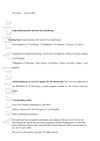 December 2024 in “http://isrctn.com/”
December 2024 in “http://isrctn.com/” MpowerTM may improve hair growth and satisfaction more than plain minoxidil, with mild side effects.
 46 citations,
October 2012 in “Dermatologic Clinics”
46 citations,
October 2012 in “Dermatologic Clinics” Female pattern hair loss diagnosed by scalp appearance, treated with combined therapies and targeted approaches.
 2 citations,
July 2021 in “Dermatologic Therapy”
2 citations,
July 2021 in “Dermatologic Therapy” A woman's hair loss after COVID-19 was likely due to a mix of pressure-induced alopecia and acute telogen effluvium.
 November 2013 in “Journal of Mazandaran University of Medical Sciences”
November 2013 in “Journal of Mazandaran University of Medical Sciences” Minoxidil with caffeine works better for hair loss than minoxidil alone.
 3 citations,
April 2019 in “Journal of Dermatological Treatment”
3 citations,
April 2019 in “Journal of Dermatological Treatment” Caffeine shows promise for treating some types of hair loss, but more research is needed.
 32 citations,
December 2017 in “Journal of Drug Delivery Science and Technology”
32 citations,
December 2017 in “Journal of Drug Delivery Science and Technology” Minoxidil and caffeine in transfersomes improve hair growth treatment.
 July 2022 in “http://isrctn.com/”
July 2022 in “http://isrctn.com/” Adding a cosmetic gel with caffeine, taurine, and growth factors to standard hair loss treatments could improve results.
 6 citations,
November 2017 in “Journal of the European Academy of Dermatology and Venereology”
6 citations,
November 2017 in “Journal of the European Academy of Dermatology and Venereology” A woman got melanoma on her scalp after anti-hair loss treatment with injections.
 November 2024 in “International Journal of Molecular Sciences”
November 2024 in “International Journal of Molecular Sciences” Nanoparticles may improve caffeine delivery for hair growth, offering a potential alternative to minoxidil for hair loss treatment.
June 2022 in “Dermatologic Therapy” Oral minoxidil and growth factors improved hair density and thickness in a girl with hereditary hair loss.
 12 citations,
April 2020 in “British Journal of Dermatology”
12 citations,
April 2020 in “British Journal of Dermatology” Caffeine may help reduce stress-induced hair loss.
 5 citations,
May 2020 in “Pharmaceutical Research”
5 citations,
May 2020 in “Pharmaceutical Research” Heat and chemicals improve finasteride delivery to scalp and hair follicles, potentially enhancing treatment for hair loss.
 25 citations,
July 2017 in “Archives of Dermatological Research”
25 citations,
July 2017 in “Archives of Dermatological Research” Herbal products might promote hair growth with fewer side effects, but more research is needed to confirm their safety and effectiveness.
 November 2023 in “Journal of Cosmetic Dermatology”
November 2023 in “Journal of Cosmetic Dermatology” The topical treatment with caffeine and Procapil 3% improved male pattern hair loss and was well tolerated after 12 weeks.
 40 citations,
August 2018 in “Skin appendage disorders”
40 citations,
August 2018 in “Skin appendage disorders” Some alternative treatments for hair loss might work, but more research is needed.
 29 citations,
December 2011 in “British Journal of Dermatology”
29 citations,
December 2011 in “British Journal of Dermatology” A new hair treatment with caffeine and other ingredients makes hair thicker and less likely to break.
 11 citations,
January 2012 in “International Journal of Trichology”
11 citations,
January 2012 in “International Journal of Trichology” Caffeine may help hair growth in hereditary hair loss.
 1 citations,
October 2023 in “International journal of Ayurveda and pharma research”
1 citations,
October 2023 in “International journal of Ayurveda and pharma research” Herbal medications might be safer and more effective for hair loss than synthetic treatments.
 3 citations,
January 2018 in “International Journal of Cosmetic Science”
3 citations,
January 2018 in “International Journal of Cosmetic Science” Hair stiffness increased by 13.2% after caffeine treatment, validating the Stiffness-Angle Law as an effective measurement method.
 August 2024 in “Cosmetics”
August 2024 in “Cosmetics” Caffeine is beneficial for skin and hair treatments but needs better delivery methods to penetrate deeper skin layers.
 13 citations,
January 2010 in “Advances in Biochemical Engineering / Biotechnology”
13 citations,
January 2010 in “Advances in Biochemical Engineering / Biotechnology” Understanding hair biology is key to developing better treatments for hair and scalp issues.
 21 citations,
January 2017 in “Skin Pharmacology and Physiology”
21 citations,
January 2017 in “Skin Pharmacology and Physiology” Caffeine-based liquid 0.2% is as effective as minoxidil 5% for treating male hair loss.
 March 2024 in “International journal of pharmaceutical sciences and drug research”
March 2024 in “International journal of pharmaceutical sciences and drug research” Androgenetic alopecia is influenced by various factors and can be treated with medications, procedures, and non-drug methods.
 September 2014 in “Hair transplant forum international”
September 2014 in “Hair transplant forum international” Caffeine, niacinamide, and panthenol may improve hair growth, fullness, and healing when applied to the scalp.
 48 citations,
October 1996 in “Dermatologic clinics”
48 citations,
October 1996 in “Dermatologic clinics” Some treatments can help with hair regrowth in alopecia areata, but results vary and long-term use is often needed without changing the disease's outcome.
 8 citations,
January 2020 in “Skin Pharmacology and Physiology”
8 citations,
January 2020 in “Skin Pharmacology and Physiology” Caffeine improves hair growth, thickness, and reduces shedding.
 14 citations,
October 2020 in “Natural Products and Bioprospecting”
14 citations,
October 2020 in “Natural Products and Bioprospecting” Various treatments, including FDA-approved drugs, natural products, and oral supplements, can help with hair loss, but a patient's medical history and potential allergies should be considered when choosing a treatment.
 September 2022 in “Polish Hyperbaric Research”
September 2022 in “Polish Hyperbaric Research” Some treatments for hair loss, like finasteride, biotin, and minoxidil, can be effective, but their success varies by individual case.
 February 2022 in “Scientia Pharmaceutica”
February 2022 in “Scientia Pharmaceutica” Different hair loss treatment ingredients work well with TrichoTech™ vehicles for 3 to 6 months, making them good for use in hair treatments.
January 2025 in “Molecules” Caffeine may help with hair loss, but more research is needed to confirm its effectiveness.



























